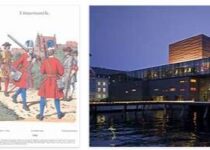Czech Republic Literature Part I
The origins of Czech literature date back to Cyril and Methodius (9th century), who were the creators of the first Slavic alphabet and the first authors of works written in Paleoslav (translation of the Holy Scriptures). But in the century. X the Paleoslav tradition was overwhelmed by Latin, which triumphed as the language of the Church and the State, giving rise to an ecclesiastical production, connected with the exercise of worship, and historical. The first important work of Czech literature is written in Latin: the Chronica Bohemorum of Prague Cosma, written at the beginning of the century. XII, then continued by others until 1198.
At the same time the vernacular Czech began to assert itself (songs, prayers, sacred legends), which in the century. XIII was also used in chronicles written in poetic form, and in the century. XIV in poetry (lyric and epic) and profane prose. Works in verse of the century. XIV are the Chronicle of Dalimil and the Chronicle of Troy, the Life of Saint Catherine, one of the most beautiful legends, the Song of Záviš and the Song of Šternberk, examples of lyric poetry. The prose works were also masterful: the Little Weaver, dialogue between a scribe in love and bad luck, the translation of Million by Marco Polo, and the satires (The squire and the student and the Satires on the craftsmen). Of the sec. XIV are also the first theatrical works (The seller of ointments); the works of Tomáš da Štítné (1333-1401 / 09), author of treatises that made the Latin religious-cultural heritage accessible to the popular masses; the moralistic satires of Smil Flaška da Pardubice (The advice of the father to the son; The new advice); numerous historical writings (in Czech and Latin); the work of the lexicographer Maestro Klaret. Dominant figure was Jan Hus (ca. 1371-1415), which influenced the whole century. XV.
According to petsinclude, religious writer Petr Chelčický stood out among his successors. Humanism entered Bohemia only in the second half of the century. XV and was expressed in both Latin and Czech. Two prominent European personalities stand out among the Latin writers: Bohuslav Hasištejnský from Lobkovice and Zikmund Hrubý from Jelení; while among the humanists who wrote in Czech, the most numerous, are the jurist Viktorin Kornel from Všehrdy, Jan Hasištejnský from Lobkovice, Mikuláš Konác from Hodiškov. In the middle of the century. XVI there was a luxuriant flowering of literary culture both in Latin and in Czech: the most important Latinists were Matouš Kolín (Collinus) from Choterina, Maestro Kampanus and P. Lupác from Hlavácov; among the chroniclers V. Hájek da Libocany stood out; among linguists, J. Blahoslav and V. Benedikti from Nudožery; in scientific literature, Daniel Adam from Veleslavín and J. Kocín from Kocinét; in secular poetry and prose Šimon Lomnický from Budec and Mikuláš Dacický from Heslov. Great importance had the publishing activity (Kralice Bible) and the literary one of the Union of Bohemian Brothers. Among the members of the Union, alongside Blahoslav, J. Augusta and J. Bílek, the politicians V. Budovec from Budov and Karel the Elder from Žerotín stood out. Also interesting are the travel diaries (by O. Prefát from Vlkanov, V. Vratislav from Mitrovice and Kryštof Harant from Polžice). After the loss of national independence (1620) there was a rapid literary decline, during which however the figure of Comenius emerged(Jan Amos Komenský), pedagogist and philosopher, and the activity of historians Pavel Stránský and Pavel Skála took place, while religious chant found followers in A. Michna from Otradovice and in Jiří Třanovský. In the second half of the century. The baroque poet Bedřich Bridel, Bohuslav Balbín, forerunner of the Enlightenment and first defender of the Czech language, and historians Tomáš Pešina from Čechorod and FJ Beckovský stood out in the seventeenth century. The revival of the national spirit and Czech literature only began at the end of the century XVIII with the Enlightenment. Historians and philologists wrote mainly in German or Latin, but with their works they laid the foundations of linguistics and historiography. Important figures were the philologist J. Dobrovský, father of Slavic studies, the historians G. Dobner and FM Pelcl and, in scope of popular literature, VM Kramérius. At the beginning of the century. XIX intellectuals began to write mainly in Czech.
The most eminent personalities of the first half of the century. XIX were the philologist and poet J. Jungmann, translator of Milton and Chateaubriand, historian F. Palacký, Slavist and poet PJ Šafařík. The first romantic authors, such as J. Kollár, panslavist and patriot, FL Čelakovský and KJ Erben, who drew inspiration from popular motifs, were followed by KH Mácha, author of the epic-lyric poem Maggio, with whom Bohemian poetry reached one of its peaks higher. At the time of Bach’s absolutist government, K. Havlíček Borovský fought for democracy and B. Němcová made himself famous with the realistic novel The Grandmother; the young writers grouped around the almanac Máj (May) at the turn of 1850 and 1860 (the so-called májovci) advocated a committed and modern literature. Among them were the poets V. Hálek, A. Heyduk and above all J. Neruda, who was also a prose writer and effective publicist, the narrators K. Světlá and J. Arbes, and the playwrights FV Jeřábek and E. Bozděch.



